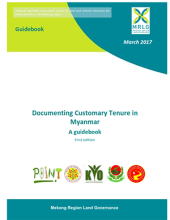Land Library Search
Through our robust search engine, you can search for any item of the over 73,000 highly curated resources in the Land Library.
If you would like to find an overview of what is possible, feel free to peruse the Search Guide.
/ library resources
Showing items 1 through 9 of 11.This dialogue provided a way for the land community to collaboratively explore challenges and opportunities related to the recognition of indigenous, ethnic minority and customary tenure rights in the Mekong region in order to:
This guidebook provides conceptual, legal and practical tools and resources to help civil society organizations guide communities through the process of documenting customary tenure at the local level.
The « Environment and Natural Resources Code of Cambodia » (Sixth Draft – – 20 November 2016) is a very extensive proposed law (535 pages !) which will have, if adopted, major impacts on many aspects of Cambodian development (Mines, Energy, Urban planning, etc..) but is particularly important for
This short thematic study challenges the assumption that the legal framework to recognize and protect indigenous peoples’ (IP) customary lands is adequate and that the challenge lies in its implementation.
This video is based on the combined efforts of 5 civil society organizations and ethnic youth organizations (88 Generation, Point, FLU, KYO&TSYU) to document local Customary Tenure practices in different villages throughout the country, in the states of Shan North, Shan South, Magwe and Kayah
The poster presents an overview of forestland, livelihoods and customary practices in Man Ping Village, Northern Shan State, Myanmar.
This book presents the findings of a nine-month action research process in Karamoja.
This paper provides an analysis of the effectiveness and equitability of West African judicial, legal and administrative institutions for:providing accessible dispute resolutionprotecting the security of the urban and rural poor to hold and use land.The authors compare legislation of customary an
Transition from subsistence to market economy is not easy. In Papua New Guinea most land is still held under traditional systems of common property resource ownership and a growing cash economy can spark conflict concerning management or ownership issues.







